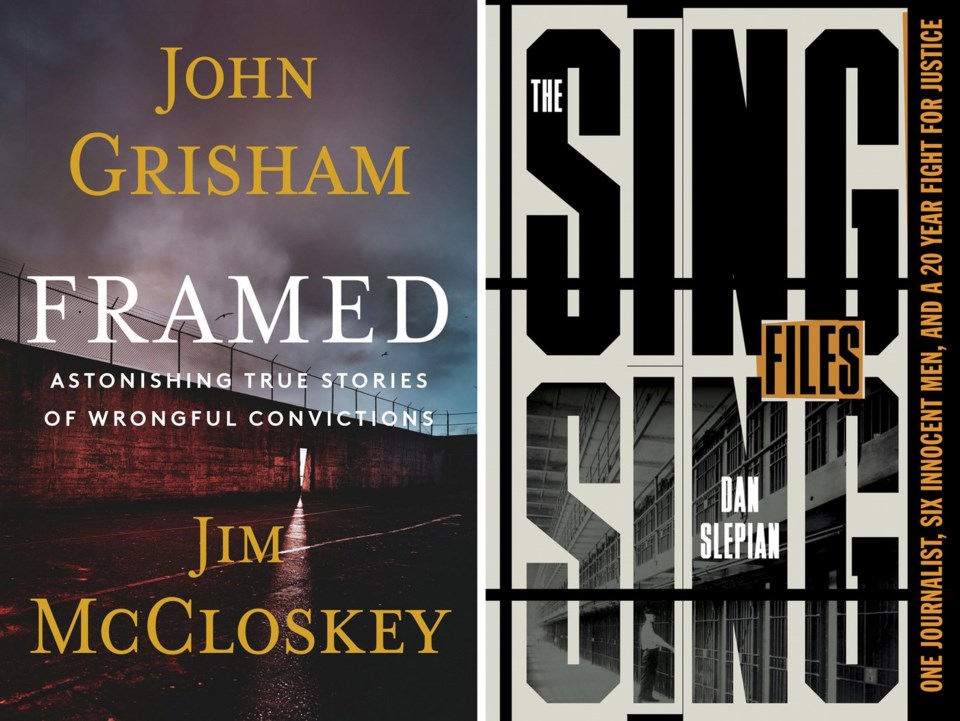“Framed: Astonishingly True Stories of Wrongful Convictions,” by John Grisham and Jim McCloskey (Doubleday) and “The Sing Sing Files: One Journalist, Six Innocent Men and a 20-Year Fight for Justice“ by Dan Slepian (Celadon)
—-
It’s painful to read those stories of men wrongly condemned and forgotten, slowly abandoned by everyone, casualties of an overzealous criminal justice system.
“Framed” is second foray into nonfiction and his storytelling skills are well-displayed here. McCloskey is founder of Centurion Ministries, which works to free the wrongly convicted. “The Sing Sing Files" focuses on six men imprisoned in the infamous New York prison.
Both books are meticulous to a fault in recounting the steps that led each of the men they focus on to conviction and imprisonment. “Framed” is more clinical, carefully assembling the stories of those wrongly imprisoned, but Slepian’s book is the more compelling and emotionally wrenching of the two, starkly illuminating the unimaginable suffering of the wrongly imprisoned and their families.
He describes one prisoner this way: “Frustration and anger seemed to be radiating off him like heat.”
Grisham and McCloskey present 10 unrelated cases around the nation; Slepian focuses on how the pursuit of one wrongful conviction led him to examine the other five.
Slepian cites figures suggesting 100,000 more innocents remain among approximately 2 million people locked away in American jails and prisons.
As the authors explain, we came to this sorry state through a combination of factors: Pressure to close cases, police and prosecutorial neglect, outright fabrications of evidence, confirmation bias and the tendency to disregard information that does not fit our emerging theory. Bogus “experts” swayed juries. Jurors gave in to pressure from other jurors. Judges refused new trials. Prosecutor reliance on jailhouse informants factored into one-fifth of wrongful convictions, according to an estimate by the Innocence Project cited in Slepian’s book. We the people have not summoned the “collective will to hold people in power accountable,” he writes.
All three writers are measured in their accounting for these justice system failures although the reader is sure to find some of the police, prosecutors and judges described here to be the real villains.
But most of the guilt for a failed system must be ours, Grisham writes. “If we as a society had the political gumption to change unfair laws, practices and procedures, we could avoid virtually all wrongful convictions.”
Well, maybe.
For now, emerging as heroes are defense lawyers who work for free, sometimes for years, to secure justice for those lacking any resources to hire lawyers to pursue their cases. In the cases described in these two books, the authors themselves deserve great credit for persevering in their quest to free the innocent.
It’s discouraging that this topic is not a subject in the presidential campaign nor, apparently, much of an issue to our fellow Americans. But for Slepian, investigating cases of wrongful imprisonment has become a focal part of his work as an NBC news producer. He writes that the sheer number of such cases is part of the “tragic consequences of America’s system of mass incarceration.”
And to him personally, pursuing such cases is more than a journalistic quest, it is, he writes, part of his “obligation as a human being.”
___
AP book reviews:
Jeff Rowe, The Associated Press


